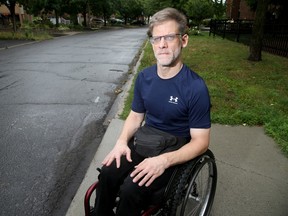Politics
Residents Challenge City Decision on Manor Park Sidewalks

Three residents of Manor Park in Ottawa have taken legal action against the city following a decision by Rideau-Rockliffe ward Councillor Rawlson King to defer the installation of sidewalks as part of an integrated renewal project. The residents, Dr. Eugiene Waters, Christina Keys, and Mark Lindenberg, have engaged Paul-Erik Veel of the Toronto-based law firm Lenczner Slaght to demand that the City of Ottawa reverse King’s decision.
In a letter addressed to Wendy Stephanson, the city manager, Veel labeled King’s deferral as “unlawful,” arguing that it exceeded the authority of a city councillor. He stated that under the Municipal Act, King does not have the power to unilaterally direct city staff to pause sidewalk construction, especially when the city council has an obligation to develop and assess municipal policies.
The letter specifically pointed to the city’s Official Plan and the Master Transportation Plan, which underscore the importance of including sidewalks in renewal initiatives. Veel emphasized that sidewalks are crucial for community safety by separating pedestrians from vehicles, thus reducing collision risks. He also highlighted their significance for accessibility and promoting active transportation.
“Users of pedestrian infrastructure in Manor Park, and the residents of Ottawa as a whole, should not have to live with those consequences for another generation, because a single city councillor does not like council’s decisions or city staff’s recommendations,” Veel wrote.
The letter demands that the city confirm within five business days that the sidewalk component of the integrated renewal project will proceed as originally planned. If the city decides against this, it must preserve all related documents and produce a formal report detailing the rationale, options, costs, and risks associated with the decision.
Interim city solicitor Stuart Huxley confirmed that the city has received the letter and stated that it is currently under review. “We can confirm that the City has received a letter regarding the deferred Manor Park sidewalk installation. The correspondence is currently under review. Consistent with the City’s standard practice, we are not able to comment further,” Huxley stated.
This legal action follows the initiation of an “integrated road, sewer, and water main rehabilitation” project on several streets in Manor Park, aimed at updating aging infrastructure. The project includes sidewalk installation on one side of the streets and various traffic calming measures, which have encountered significant opposition from some residents.
King announced his decision to delay sidewalk implementation in a newsletter on September 5, 2023. He cited extensive community consultation, including a survey conducted by his office, as the basis for his decision. In the newsletter, he emphasized the need for a comprehensive evaluation of future pedestrian demand patterns and appropriate sidewalk placement, alongside integrating active transportation infrastructure.
“I believe this deferral is a measured decision that balances the City’s active transportation objectives with the unique circumstances of Manor Park,” King wrote. He expressed his commitment to ensuring that future investments are safe and aligned with the long-term needs of the community.
Lindenberg, one of the signatories of the letter, voiced his disagreement with King’s assessment. In a previous op-ed for the Ottawa Citizen, he shared how sidewalks enable him, as a wheelchair user, to access local amenities and navigate the city safely. He noted that the absence of sidewalks severely limits his mobility, particularly in winter.
“Sidewalks make any neighbourhood more livable and accessible, for all – whether you drive a car, walk, or however you roll,” Lindenberg stated. He expressed surprise that the inclusion of sidewalks in urban renewal projects could be up for debate, asserting that they are fundamental to city policy and engineering priorities.
Dr. Waters also expressed concern about the implications of King’s decision. As a family physician and resident of Manor Park, she regularly encounters patients with disabilities who rely on safe pedestrian infrastructure. “This decision could set a negative precedent across the city, suggesting that sidewalks and residential neighbourhoods are negotiable,” Waters remarked.
She emphasized the importance of sidewalks for improving accessibility and safety in residential areas. “In 2025, these are basic road safety and accessibility measures that should not be up for debate,” Waters stated. “The city’s policies indicate that it’s a settled issue. This is part of future-proofing our city.”
In a follow-up email to the Ottawa Citizen, King maintained that his decision was made after extensive discussions with city staff over the course of eight months. He reiterated that the deferral would allow for proper planning, including a community-wide transportation study.
“Deferral creates the space for proper planning. My office is having ongoing discussions with city staff concerning communication on this file, go-forward timelines, and the legislative options potentially required for a comprehensive traffic analysis for Manor Park,” King explained.
As the situation develops, residents and local leaders continue to advocate for the urgent implementation of sidewalks to ensure safety and accessibility in their community.
-

 Politics4 weeks ago
Politics4 weeks agoSecwepemc First Nation Seeks Aboriginal Title Over Kamloops Area
-

 World5 months ago
World5 months agoScientists Unearth Ancient Antarctic Ice to Unlock Climate Secrets
-

 Entertainment5 months ago
Entertainment5 months agoTrump and McCormick to Announce $70 Billion Energy Investments
-

 Science5 months ago
Science5 months agoFour Astronauts Return to Earth After International Space Station Mission
-

 Lifestyle5 months ago
Lifestyle5 months agoTransLink Launches Food Truck Program to Boost Revenue in Vancouver
-

 Technology3 months ago
Technology3 months agoApple Notes Enhances Functionality with Markdown Support in macOS 26
-

 Lifestyle3 months ago
Lifestyle3 months agoManitoba’s Burger Champion Shines Again Amid Dining Innovations
-

 Top Stories2 months ago
Top Stories2 months agoUrgent Update: Fatal Crash on Highway 99 Claims Life of Pitt Meadows Man
-

 Politics4 months ago
Politics4 months agoUkrainian Tennis Star Elina Svitolina Faces Death Threats Online
-

 Sports5 months ago
Sports5 months agoSearch Underway for Missing Hunter Amid Hokkaido Bear Emergency
-

 Politics5 months ago
Politics5 months agoCarney Engages First Nations Leaders at Development Law Summit
-

 Technology5 months ago
Technology5 months agoFrosthaven Launches Early Access on July 31, 2025




















